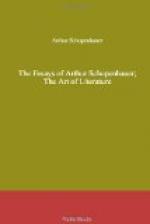On the other hand, where the matter is accessible to everyone or very well known, everything will depend upon the form; and what it is that is thought about the matter will give the book all the value it possesses. Here only a really distinguished man will be able to produce anything worth reading; for the others will think nothing but what anyone else can think. They will just produce an impress of their own minds; but this is a print of which everyone possesses the original.
However, the public is very much more concerned to have matter than form; and for this very reason it is deficient in any high degree of culture. The public shows its preference in this respect in the most laughable way when it comes to deal with poetry; for there it devotes much trouble to the task of tracking out the actual events or personal circumstances in the life of the poet which served as the occasion of his various works; nay, these events and circumstances come in the end to be of greater importance than the works themselves; and rather than read Goethe himself, people prefer to read what has been written about him, and to study the legend of Faust more industriously than the drama of that name. And when Buerger declared that “people would write learned disquisitions on the question, Who Leonora really was,” we find this literally fulfilled in Goethe’s case; for we now possess a great many learned disquisitions on Faust and the legend attaching to him. Study of this kind is, and remains, devoted to the material of the drama alone. To give such preference to the matter over the form, is as though a man were to take a fine Etruscan vase, not to admire its shape or coloring, but to make a chemical analysis of the clay and paint of which it is composed.
The attempt to produce an effect by means of the material employed—an attempt which panders to this evil tendency of the public—is most to be condemned in branches of literature where any merit there may be lies expressly in the form; I mean, in poetical work. For all that, it is not rare to find bad dramatists trying to fill the house by means of the matter about which they write. For example, authors of this kind do not shrink from putting on the stage any man who is in any way celebrated, no matter whether his life may have been entirely devoid of dramatic incident; and sometimes, even, they do not wait until the persons immediately connected with him are dead.
The distinction between matter and form to which I am here alluding also holds good of conversation. The chief qualities which enable a man to converse well are intelligence, discernment, wit and vivacity: these supply the form of conversation. But it is not long before attention has to be paid to the matter of which he speaks; in other words, the subjects about which it is possible to converse with him—his knowledge. If this is very small, his conversation will not be worth anything, unless he possesses the




